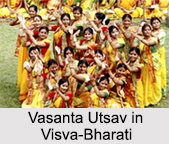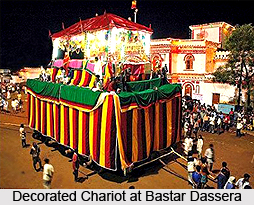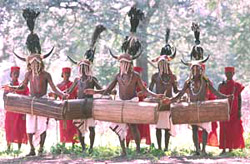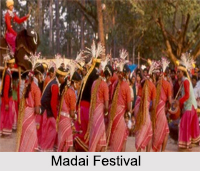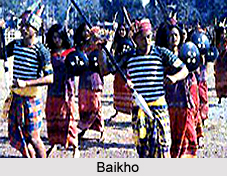 Assam the eastern most state of the Indian subcontinent is full of colours and diversities, which is well reflected in the chain of festivals of different tribes throughout the year. The perfect fusion of rich glory of the ancient heritage and spirituality of the tribes and sub tribes has made the state of Assam the home of a long procession of the most colourful festivals which are full of passion, compelling, mesmerizing, and reflecting the true secular spirit, tradition and lifestyle of the people. The specific aim behind the celebration of these festivals of Assam is to bring all the people together which facilitates a spirit of accommodation and togetherness that characterizes the celebration of all festivals.
Assam the eastern most state of the Indian subcontinent is full of colours and diversities, which is well reflected in the chain of festivals of different tribes throughout the year. The perfect fusion of rich glory of the ancient heritage and spirituality of the tribes and sub tribes has made the state of Assam the home of a long procession of the most colourful festivals which are full of passion, compelling, mesmerizing, and reflecting the true secular spirit, tradition and lifestyle of the people. The specific aim behind the celebration of these festivals of Assam is to bring all the people together which facilitates a spirit of accommodation and togetherness that characterizes the celebration of all festivals.
Religious Festivals
The state of Assam has a number of religious festivals which are discussed elaborately below as follows:
Bihu Festival
Bihu is the most awaited festival in the state of Assam. One of the major festivals of Assam, Bihu is celebrated, in 3 different forms during 3 different times of the year, viz Bohag Bihu or Rongali Bihu in April, Magh Bihu or Bhogali Bihu in January and Kati Bihu or Kongali Bihu in the months of October and November.
Rajini Gabra
One of the most special and much-awaited festivals of Assam for the colourful Dimasa tribe, the Rajini Gabra is in fact regarded as a socio-religious festival and is generally observed as an introductory festival before the starting of a new cultivation. The festive celebration of the Rajini Gabra is done during the daytime. The village headmen also known as the "Kunang" propitiates the family deity by closing the gate of the village on the date of worship. On the same night in a warm and cordial function called "Harni Gabra" the presiding deity is worshipped for the welfare of the people.
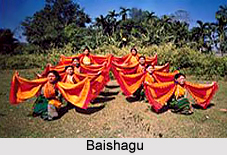 Baishagu
Baishagu
The festival of Baishagu is generally celebrated by the Bodo Kacharis tribe during mid-April. The Bodo tribe celebrates this festival in the season of spring at the advent of the New Year. This festival is devoted to Lord Shiva or "Bathou" as he is worshipped during this festival with utmost devotion and offerings of chicken and rice beer.
Rongker and Chomangkan
The two most important festivals of the Kabris, an indigenous tribe of the Karbi Analong are Rongker and Chomangkan. The former one is a springtime festival and is performed at the beginning of the year, in the month of April. This festival also embodies various shades of merriment and is observed to propitiate different deities both male and female for the well being of the entire village. The main reason for celebrating this festival is to make the people free from the diseases and natural calamities throughout the year and also seek the blessings for bounteous yield of crops. The women-folk are not allowed to enter the premises of the worship during this auspicious festival. The latter one is a festival dedicated to the dead. It can be redefined as a death ceremony. This is a non-stop 4 days and night"s celebration and demands participation from every Karbi.
Majuli
The festival of Majuli is held on the bank of the River Luit in the state of Assam, which is indeed a backdrop of immense scenic beauty. The most striking phenomenon of this festival is the assimilation of different ethnic groups under one sky to exemplify the resplendence of their culture and heritage. Special events are organized round the clock and give a lot of scope to the general folk to participate in it.
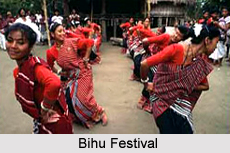 Dehing Patkai Festival
Dehing Patkai Festival
This special festival of eastern Assam has derived its name from the lofty Patkai range and the playful Dehing River and is organized in the month of January every year. The festive celebrations are regarded as a heady cocktail of ethnic fairs, tea heritage tours, golfing, wildlife excursion, adventurous sports and down memory lane trips to World War II cemeteries and the Stilwell Road (once used as the passage to the Golden land of Myanmar).
Bohaggiyo Bishu Festival
Regarded as the most fascinating springtime festival of the Deoris, one of the four divisions of Chutiyas who are believed to have been members of the great Boro race, this is a time of merriment throughout the state of Assam. The literal meaning of the term "Bishu" after breaking up the whole words stands as "Bi", which signifies, extreme and "Su" signifies rejoicing like other springtime festivals.
Ali-Ai-Ligang
This springtime festival of the Mishing tribe is the most colourful festival held every year on the first Wednesday of the month "Ginmur Polo" or the months of February/ March. The literal meaning of the festival stands as "Ali" signified as root/seed, "Ai" which means fruit, and "Ligang" means sow. The ceremonial sowing of paddy starts on this day. The young boys and girls perform a dance, which features brisk stepping, flapping and flinging of hands as well as swaying of hips thus representing youthful passion and reproductive urge. The festival continues for five days and rice, beer, pork and dried fish is essential for this feast. Certain social taboos and superstitions are maintained during this festival.
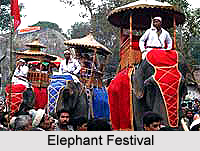 Baikho
Baikho
Baikho is another springtime festival, which is only celebrated to propitiate the extreme powerful Goddess of Wealth "Baikho". The Rabha community of Assam, who do not have any national festival of their own mainly, celebrates this festival with equal amount of pomp and grandeur.
Ambubachi Festival
Hosted in the Kamakhya Devi temple in Guwahati, the Ambubachi festival is organised during the monsoon season, every year. The festival, organized for a span of 4 days, brings out the Tantric culture practiced in many parts of Assam. The legend behind this unique fair is that Goddess Kamakhya goes through her menstrual cycle for the first 3 days of the festivities. This follows strict restrictions by the devotees who do not take a bath or cook a meal. People even refrain from reading holy books or performing Puja during these 3 consecutive days. After the said days are over, Goddess Kamakhya is cleaned with water and milk and after the grand ceremony, the temple doors welcome the devotees to come and worship the Goddess Kamakhya.
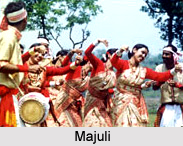 State Festivals
State Festivals
The two of the most important state festivals of Assam are discussed as follows:
Elephant Festival
This is an important festival organized by the Forest Department and Tourism Department of the Government of Assam and is held at Kaziranga National Park every year for conservation and protection of Asiatic elephant. The festival will be marked by various activities by the domestic elephants as well as different cultural performances.
Brahmaputra Beach Festival
The Brahmaputra Beach Festival is organized by the Assam Boat Racing and Rowing Association of Guwahati on a sandy beach of the mighty River Brahmaputra in association with Tourism Department of the Government of Assam. This annual festive celebration is marked with different cultural programmes and adventurous participation in the arena of sports.

